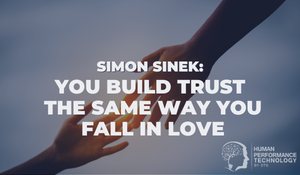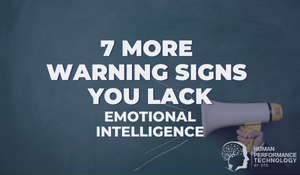Are you Aware of Your Frustration Level and its Impact?
On a scale of 1-10, how frustrated are you feeling today? Frustration is often an emotion that goes undetected. Sure, we can experience the full-blown, traffic-jam frustration that gets you gripping the steering wheel with-white knuckle intensity (I learnt to drive in Italy – need I say more)!
More often, however, we experience frustration as low-level noise that just sits in the background of our mind.
Pausing and listening out for this subtle frustration drone could be the difference between a high performing day with effective and meaningful conversations with your team and family, versus one of those days where you feel everyone and everything is getting in the way of your goals for the day.
The Main External Irritants for Leaders Right Now
Mostly, our frustrations are externally driven by people, occurrences, events that automatically trigger our frustration bucket to open up and spill its contents onto our nervous system.
Here's a list of current common irritants I’ve collected from conversations with CEOs and senior leaders during recent mentoring sessions. Do any of these resonate with you?
- A colleague's regular passive-aggressive tone in emails
- Their team’s increasing distraction by the crisis
- Their efforts to raise team performance being regularly hijacked by mental and emotional neediness
- Previously ‘best in show’ performers now going awol since #wfh
- The brutal realisation that this scenario is now their life and that they’re responsible for an outcome over which they have little control
- The words Pivot, Uncertain, Challenging times and New normal (to be fair, this one might be from my own personal irritants list)
- Increasing level of fatigue showing up as sloppy work, unproductive meetings, missed deadlines and lack of engagement
Is there something in this list that turned your frustration up a notch when you read it? Or if not, what else is getting under your skin?
A 2018 study published in the Frontiers in Human Neuroscience analysing frustrated drivers found that frustration has a negative effect on attentiveness, judgment and decision-making. All-important qualities needed for optimal leadership.
Clearly, though frustration is a very human emotion, letting it hijack our day is not very useful.
How to Channel Frustration for Optimal Performance
Just imagine what it would feel like to be able to turn frustration into a positive behaviour or emotion? If instead of frustrating you, that irritant became the trigger to channel a better you?
The benefits could be huge:
- Increased energy (frustration uses up a lot of brain energy)
- Increased day/life satisfaction (you’d feel more in control of your life)
- Increased serenity (author Lisa O’Neill recently said ‘Imagine how awesome it would be to go through life feeling serene all the time’ - there's an elevating thought)
- Increased influence (cool, calm and collected leaders are more influential than short-tempered ones)
How much energy would you save, how much more pleasant would your day be, how much more positive impact could you have on your team’s performance?
Genes Under the Microscope
There is no doubt that our frustration threshold changes on a daily basis. This could be due to how tired we are, the environment we're in (some environments may present many irritants all in one go), level of stress.
However, some people's frustration threshold is lower than others' and this is genetically based. Several genes related to dopamine, serotonin and histamine metabolism can fill our 'frustration' cup much more quickly.
Understanding whether our frustration cup is already half full genetically can give us a huge advantage in terms of emotional self-regulation. By changing behaviours, diet and lifestyle habits that interact negatively with those genes, we can give ourselves the best chance at reducing our levels of frustration.
How to Turn an Irritant into a Pearl
BJ Fogg, Professor of Behaviour Science at Stanford University, also a mentor and teacher of mine, has developed the science to do just that. After researching patterns of behaviours in tens of thousands of subjects over the past 20 years, Prof Fogg has developed a technique which he calls Pearl Habits. To quote BJ Fogg:
“I call these ‘pearl habits,’ because they use prompts that start out as irritants, like a grain of sand in an oyster shell, and turn them into something beautiful.”
This is a super simple concept that you can start applying in your life today. Find an irritant in your own life, then use it as a trigger to do something that is positive, helpful, or meaningful for your everyday life.
For example, one of Alex’s major irritants right now is his teenage daughter missing school deadlines during lockdown. Alex is the Head of People and Culture in a Melbourne-based firm. He has been sharing home-schooling duties with his wife who is a senior partner in a law firm, for the past six weeks. Every time he finds out she has missed the deadline and starts to feel his frustration rise, he now automatically takes a 30 second timeout to breathe slowly and deeply and focus on two positive qualities he’s grateful for in his daughter.
This technique doesn’t improve his daughter's homework performance, but it makes a huge difference to how Alex feels, his energy and his ability to regain control over his thinking brain so that he can then show up at his team meeting clear-headed and calm.
Smart Hack: How to Develop your Pearl Habits
- Take 30 seconds right now to jot down three irritants you’ve already encountered today. These could be small things such as finding the sink being full of used mugs in the morning, or your coffee on your way to work not being hot enough, or finding an aggressive message in your inbox.
- Identify how the irritants made you feel.
- Angry
- Anxious
- Stressed
- Tired
- Feeling like you want to give up?
- Note what negative behaviours or thinking pattern this triggered
- Perhaps you carried the frustration into your next conversation
- You showed up at your next meeting with a negative, judgemental attitude
- You responded to an email in a passive-aggressive way
- You reached out for comfort food
- You lost your mojo for the next two hours
- You unconsciously decided today was going to be a write-off
- Follow this 3-step process to turn each of your top three irritants into Pearl Habits. From BJ Fogg’s book, Tiny Habits:
- Explore new, beneficial habits you could do after the annoyance. Come up with at least five options.
- Select your best option from step 1 and create a Tiny Habit Recipe. For example: After I find the dirty mugs in the sink, I list three things I love about my partner.
- Start practising your Pearl Habit. (And notice what happens to your irritation level.)
About the Author
Alessandra Edwards is a wellbeing and peak performance expert, who blends scientific evidence, clinical training and experience to mentor leaders and teams on high-performance strategies based on their individual genetics and neurobiology.
She has recently co-written a book with Dr Amy Silver on how to ensure physical and psychological safety through COVID-19. The book is called Brace for Impact: How to Survive and Thrive in the Pandemic Era.
The events of 2020 have profoundly changed our priorities and operations. In these times where business, society, and the economy are being reshaped, we have also seen people and organisations step up and forge their path into the Next Normal.
In What The Hell Do We Do Now?, 18 authors explore the tools and frameworks that can help leaders and organisations navigate and emerge from the crisis in better shape than when they entered it. The contributors draw on their own research across a wide range of domains including Psychology, Systems Thinking, Genetics, Strategic Foresight and Neurodiversity. The book follows the narrative arc of Victoria Lynn Schmidt’s Heroine‘s Journey, a journey of being thrust into chaos and returning transformed through the challenges faced.
The book is currently #1 across all business categories on Amazon Australia and in the top 20 worldwide. All proceeds are being donated to Foodbank.
Topics:
Coaching & MentoringGuest Author
Occasionally we invite guest authors to share fresh content and ideas in our Knowledge Centre. Each post has a unique "About the Author" section so that you can learn more about each contributor.



We Would Like to Hear From You (0 Comments)